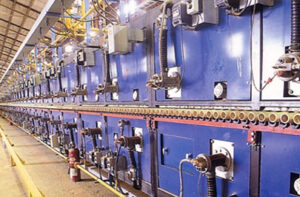Setting Up a Tiles Factory
Setting up a ceramic tiles factory in Morbi is a great idea if you have a passion for design and a desire to make your own products. In this article, we will discuss the various expenses involved in setting up a tiles factory, including labour costs, equipment, and the cost of licensing and permits. In addition, we will discuss other expenses, such as office supplies, payroll, marketing, research, and utilities. While Nigeria is one of the largest producers of ceramic tiles in Africa, it also produces the highest volume of tiles in West Africa. We can easily estimate that the combined production capacity of local ceramic tiles ranges from one hundred to one hundred and fifty square meters a day.
The ceramic tile manufacturing business is a rapidly expanding sector in Morbi. More than 5000 workers are directly employed in the sector, including over 40% of women. Moreover, foreign nationals occupy top management positions and work in the technical departments. While China dominated the market for imported tiles, Morbi has developed its own expertise in the field. As a result, consumers prefer to buy locally produced tiles over imported ones.

The company’s innovative design and quality make them an excellent choice for any project. This Morbi tile factory is ISO 9001:2008 certified and supplies its products throughout India. It offers a wide variety of tiles for flooring, walls, bathrooms, and other applications. The company can supply its products anywhere in India and can also handle commercial and residential constructions. These companies have the expertise to deliver the highest quality ceramic tiles in Morbi.
Setting Up a Tiles Factory in Morbi
A surfacing unit can be a tile factory. A tile factory consists of a series of equipments used for making tiled surfaces. Each unit has its own set of special features, and they all have to be carefully chosen. The cost of a surfacing unit varies greatly depending on the quality of tiles it produces and the number of different types. Here are some of the main features of a surfacing unit.
Tile manufacturing is one of the world’s hi-tech industries. Technological advancements in this field are constantly innovating, with new technologies being developed to make tile production even faster and more efficient. The manufacturing process has become increasingly advanced, from monoporosa (dense body single firing) to digital ink jet printing technology. These developments have made it easier for tile manufacturers to meet the needs of both commercial and residential markets, and have created a highly-specialized industry.
To make ceramic tiles that are eco-friendly, there are certain steps that need to be followed. The production process must be batch-formed, which reduces oscillations in the production process. By-products must be monitored to determine their main characteristics and processing conditions. Another aspect of the manufacturing process requires special attention – the visual aspect. In this study, three kinds of porcelain stoneware by-products were evaluated and investigated for their suitability to be used as tiles.